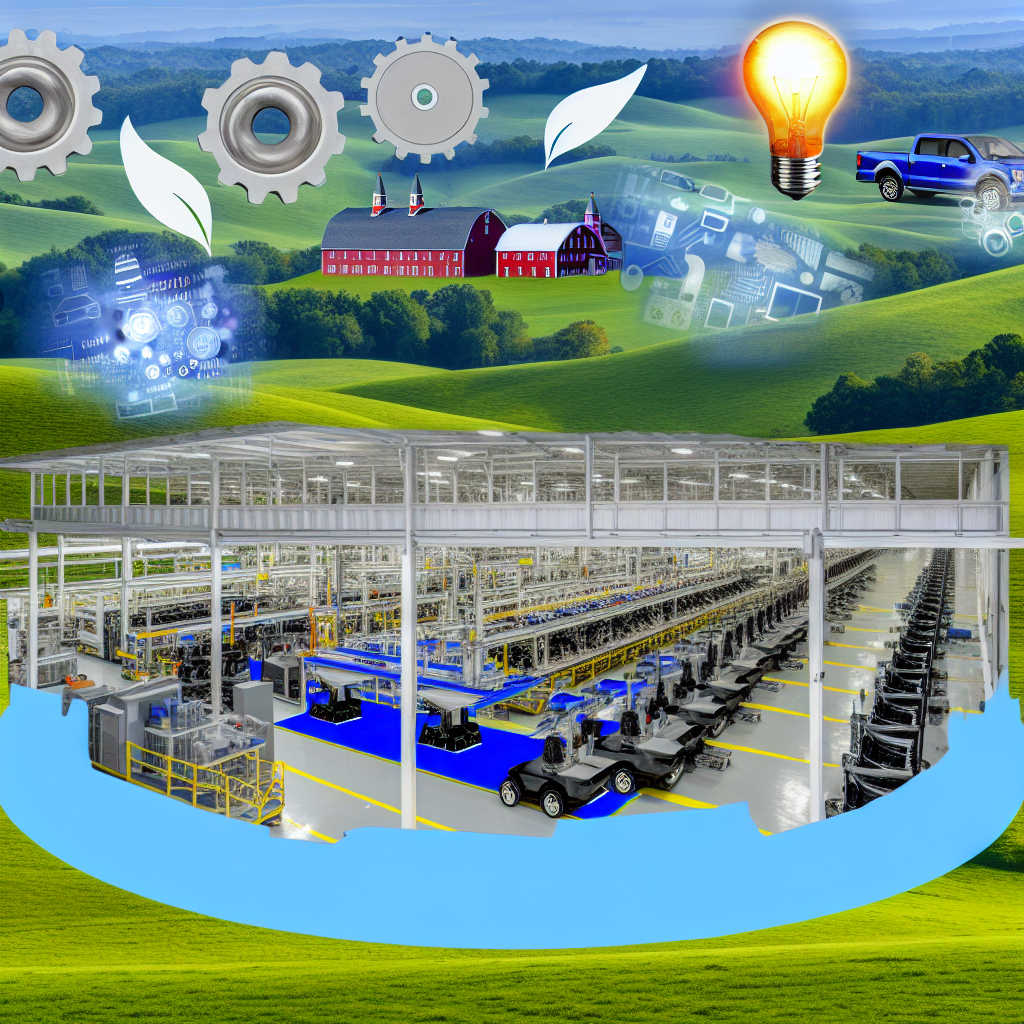Ford’s electric vehicle investment marks a significant shift in the automotive landscape, as the automaker pledges nearly $2 billion to enhance its Kentucky plant for electric vehicle manufacturing. This strategic move is part of Ford’s broader EV strategy aimed at producing more affordable electric vehicles that are not only competitive but also profitable. Announced at the Ford Louisville Assembly Plant, the initiative signals a critical transformation from traditional gasoline-powered cars to innovative electric truck production in the heart of Kentucky. CEO Jim Farley emphasized the historical importance of this shift, calling it a “Model T moment” for the company’s EV division, echoing the revolutionary production techniques of Henry Ford. With a targeted focus on creating a midsize electric pickup truck by 2027, Ford aims to establish a foothold in the burgeoning electric vehicle market while revitalizing local employment and the economy.
The recent announcement from Ford Motor Company about its monumental financial commitment to EV manufacturing represents more than just a shift in product offerings; it heralds a new era in automotive innovation. With plans to repurpose the Louisville Assembly Plant for turning out affordable electric trucks, Ford seeks to redefine its role in the electric vehicle market. This investment is closely tied to the company’s ambition to implement state-of-the-art production techniques that promise to enhance efficiency and reduce costs. By targeting both domestic and international customers, Ford’s focus on affordable electric vehicles positions it favorably against rising competition, particularly from abroad. As the automotive giant gears up for this transition, it is not just about manufacturing electric vehicles but also about solidifying its legacy in a rapidly evolving industry.
Ford Electric Vehicle Investment Set to Transform the Automotive Landscape
Ford Motor Co. is gearing up to revolutionize its manufacturing approach with a significant investment of nearly $2 billion directed toward its Louisville Assembly Plant. This upgrade is crucial as it pivots towards the production of electric vehicles (EVs) that are not only affordable but also more profitable and competitive in an increasingly saturated market. As the company’s CEO, Jim Farley, articulated, this strategic move signifies one of the most transformative projects within the automotive sector, aligning with their long-term goal of sustainability and innovation. The focus on affordability responds to consumer demand for cost-effective alternatives, ensuring that Ford remains competitive against both traditional rivals and emerging electric vehicle manufacturers.
In addition to financial investment, this initiative represents a commitment to workforce stability, aiming to secure approximately 2,200 hourly jobs with the factory’s transformation. This is a vital aspect considering the broader implications for the local economy in Louisville, Kentucky—a region historically linked to automotive production. By upgrading its facilities for electric vehicle manufacturing, Ford sets a precedent for other automakers, demonstrating a pathway to profitable and scalable electric vehicle production that can meet increasing market demands. This is just the beginning of a new chapter for Ford as it embraces electric mobility.
Ford EV Strategy: Emphasizing Affordable Electric Vehicles
The heart of Ford’s electric vehicle strategy revolves around creating affordable electric vehicles, a response to both market pressures and consumer expectations. The company has recognized that to truly establish a foothold in the electric vehicle market, they must offer products that not only meet a baseline of quality and performance but also fall within a price range that is accessible to the average consumer. The upcoming midsize electric pickup truck, projected to debut in 2027, highlights this commitment with a target starting price around $30,000. By focusing on affordability, Ford is positioning itself to attract a broader customer base and compete head-to-head with existing and new entrants in the EV space.
Moreover, affordability in Ford’s EV strategy is further complemented by their approach to manufacturing, which aims to reduce production costs significantly. The planned assembly tree model at the Louisville facility will enable faster production times and lower operational costs due to a streamlined components system. Through innovative manufacturing techniques that minimize the number of parts and assembly workstations, Ford anticipates that efficiencies gained will contribute to maintaining affordability while ensuring profitability—a critical balance as the company ventures further into the competitive world of electric vehicles.
Kentucky Electric Truck Production: A New Era for Ford
Kentucky is set to play a pivotal role in Ford’s electric vehicle expansion, particularly with the production of the new midsize electric pickup truck at the Louisville Assembly Plant. This factory has a storied history of manufacturing gasoline-powered vehicles, but the shift toward electric truck production signifies a crucial adaptation to the evolving automotive landscape. The focus on electric trucks aligns with growing consumer interest in sustainable and eco-friendly transport solutions. As Ford redefines its production approach in Kentucky, it also commits to job creation, reinforcing the region’s importance in the future of automotive manufacturing.
This transformation in Kentucky not only cements Ford’s legacy but also enhances the state’s position as a leader in electric vehicle innovation. Governor Andy Beshear’s remarks about the transformational impact of this investment highlight the broader community and economic benefits. The upgrades at the Louisville Assembly Plant are expected to attract new suppliers and support a domestic supply chain that can sustain growth in the electric vehicle market over the coming years. With major investments and a focus on producing electric trucks, Ford is not only revolutionizing its operations but also contributing to the socio-economic landscape of Kentucky.
The Future of Electric Vehicle Manufacturing at Ford
As Ford pivots towards electric vehicle production, the future of manufacturing appears not only brighter but also more efficient. The company’s implementation of a uniform platform designed for electric vehicles is anticipated to streamline production processes across various models, thereby enhancing scalability. This innovative approach will ultimately reduce complexity and manufacturing costs, paving the way for Ford to deliver a diverse range of affordable electric vehicles to consumers. By integrating advanced manufacturing techniques and a reimagined assembly line structure, Ford is setting the groundwork for a sustainable future in vehicle production.
Furthermore, a critical aspect of Ford’s future manufacturing landscape is the emphasis on domestic production and local job creation. With a combined investment of nearly $5 billion in the Kentucky assembly plant and the Michigan battery facility, Ford aims not only to enhance its competitive strategy but also to reinforce its commitments to American jobs and the economy. This focus on local supply chains and production capacity will strengthen Ford’s positioning within the global electric vehicle market, setting the stage for a successful shift towards electric mobility.
Competing in the Electric Vehicle Market: Ford’s Response to Challenges
As Ford embarks on its ambitious EV strategy, the company faces formidable competition, particularly from Chinese automakers, who are expanding rapidly with relatively affordable electric vehicles. To respond to this challenge, Ford is not just focusing on the quantity of vehicles produced but on establishing a sustainable and profitable electric business model. By leveraging its historical strengths in manufacturing and aligning them with modernized practices, Ford aims to differentiate itself in a crowded market. The upcoming midsize electric truck represents this strategy, showcasing Ford’s commitment to delivering quality that resonates with consumers amidst rising competition.
Ford’s commitment to innovative technology and sustainable practices also plays a vital role in addressing competitive pressures. By prioritizing affordability and efficiency in production, they are uniquely positioned to provide superior solutions to customers compared to competitors. As Farley reiterated, Ford’s target remains clear: to offer electric solutions that surpass anything the competition can deliver while creating a viable business model that supports growth and meets customer demand. Such strategic focus on innovation and quality is crucial for Ford as it navigates the challenges posed by fast-growing competitors in the electric vehicle sector.
Revitalizing U.S. Automotive Industry Through Electric Vehicles
Ford’s investment in electric vehicle production signifies a broader revitalization of the U.S. automotive industry, reflecting a shift towards more sustainable manufacturing practices and modern vehicle offerings. By upgrading the Louisville Assembly Plant to focus on electric vehicle production, Ford is not just changing its own operational paradigm but is also leading a national conversation about the future of American manufacturing. The emphasis on creating affordable electric vehicles resonates with increasing consumer interest in sustainability and positions Ford as a fundamental player in driving the industry towards a greener future.
This focus on electric vehicles is expected to spark broader changes across the automotive landscape, aided by the introduction of advanced manufacturing techniques that prioritize efficiency and reduce production time. As other manufacturers observe Ford’s strategies and the resulting outcomes, we may see a wave of transformation as industry players adapt to meet both consumer and environmental demands. Through this commitment to innovation and adaptability, Ford is paving the way for a new era in automotive production that could alter the very fabric of the industry.
The Role of Battery Technology in Ford’s EV Strategy
Central to Ford’s electric vehicle strategy is the development and production of cost-effective batteries, which are essential for enhancing the overall affordability and performance of electric vehicles. A significant aspect of Ford’s plan includes utilizing advanced battery technologies produced at its facility in Michigan. This integration of in-house battery production aims to decrease costs and improve the efficiency of electric vehicle systems, ensuring that their upcoming models remain both competitive and attractive to consumers. The ability to manage battery technology within the supply chain represents a strategic advantage that will support Ford’s ambitions in the EV market.
By investing in battery technology, Ford is not only addressing immediate needs for cost-effective electric vehicles but is also positioning itself to innovate further in energy storage solutions. As demand for electric vehicles continues to grow, having a robust, domestic battery supply chain will be critical for maintaining competitive pricing and ensuring high-quality electric vehicle offerings. This forward-thinking approach will likely enhance Ford’s reputation and customer loyalty as they deliver reliable, efficient, and environmentally conscious vehicles.
Building an Electric Future: Community Engagement and Economic Growth
As Ford revitalizes its factories for electric vehicle production, community engagement and economic growth stand at the forefront of this evolution. The commitment to creating approximately 2,200 jobs at the Louisville Assembly Plant illustrates Ford’s dedication to local economies and the importance of community relations in their strategic planning. This multi-billion-dollar investment is expected to not only enhance Ford’s operations but also bolster the surrounding communities, fostering economic development by attracting suppliers and supporting the workforce.
Beyond job creation, Ford’s plans for the Louisville plant signify a long-lasting partnership with the state of Kentucky that dates back generations. By producing electric vehicles domestically, Ford is contributing to a sense of local pride and commitment to sustainability that resonates with consumers. This focus on community and economic benefit underscores Ford’s strategic objectives as they navigate the transition to electric vehicle manufacturing, demonstrating that their commitment extends beyond production to include social responsibility and active engagement in strengthening local economies.
Frequently Asked Questions
What is Ford’s electric vehicle investment strategy in Kentucky?
Ford’s electric vehicle investment strategy in Kentucky involves a nearly $2 billion investment to upgrade the Louisville Assembly Plant for producing affordable electric vehicles (EVs). This initiative includes transforming the existing gasoline-powered vehicle production line into an electric vehicle manufacturing facility, aimed at enhancing profitability and competitiveness in the EV market.
How will Ford’s Louisville Assembly Plant contribute to electric vehicle manufacturing?
The Louisville Assembly Plant will play a crucial role in Ford’s electric vehicle manufacturing by transitioning from traditional production to building a midsize electric pickup truck. This plant will implement a new universal platform designed to reduce production costs and assembly times, ensuring that Ford’s electric vehicle investment yields more affordable models for consumers.
What new models can we expect from Ford’s electric vehicle investment?
From Ford’s electric vehicle investment at the Louisville Assembly Plant, the first new model expected is a midsize, four-door electric pickup truck set to release in 2027. This vehicle is part of Ford’s broader EV strategy, focusing on creating affordable electric vehicles for both domestic and international markets.
How many jobs will Ford’s electric vehicle investment create in Kentucky?
Ford’s electric vehicle investment is projected to secure approximately 2,200 hourly jobs at the Louisville Assembly Plant, contributing to the local economy and enhancing the workforce dedicated to electric vehicle manufacturing.
What technological innovations will Ford implement in its electric vehicle production?
Ford plans to implement an ‘assembly tree’ production system at the Louisville Assembly Plant, which includes three concurrent sub-assembly lines that merge, significantly increasing efficiency. This innovation will facilitate the mass production of affordable electric vehicles while streamlining operational processes.
What is the anticipated starting price of Ford’s new electric truck?
The anticipated starting price of Ford’s new midsize electric truck from the Louisville Assembly Plant is around $30,000. This pricing strategy is part of Ford’s commitment to producing affordable electric vehicles that appeal to a broad range of consumers.
How does Ford plan to compete with Chinese electric vehicle manufacturers?
Ford aims to compete with Chinese electric vehicle manufacturers by focusing on creating a sustainable and profitable electric vehicle business that resonates with customers. Ford’s new EV strategy emphasizes the introduction of high-quality, affordable models, like the midsize electric truck being developed in Louisville, which they believe will outperform rivals in the market.
What impact will Ford’s electric vehicle investment have on the U.S. supply chain?
Ford’s electric vehicle investment is expected to bolster the U.S. supply chain by creating or maintaining nearly 4,000 direct jobs across its Kentucky and Michigan facilities. The investment will also promote collaboration with numerous new U.S.-based suppliers, thereby strengthening the domestic manufacturing ecosystem for electric vehicles.
What are the broader goals of Ford’s electric vehicle strategy?
The broader goals of Ford’s electric vehicle strategy include making electric vehicles more affordable, increasing production profitability, and establishing a leading position in the EV market in response to competitive pressures from global rivals. Ford aims to revolutionize its production approach to ensure that the electric vehicles resonate with consumers across diverse markets.
What significant changes are being made to Ford’s assembly processes for electric vehicles?
Significant changes to Ford’s assembly processes include moving from a traditional continuous conveyor system to an assembly tree format, which reduces complexity and speeds up production. Additionally, Ford plans to decrease the number of components and fasteners to simplify the assembly of affordable electric vehicles.
| Key Points |
|---|
| Ford is investing nearly $2 billion to upgrade a factory in Kentucky for electric vehicle (EV) production. |
| The CEO announced the EV strategy at Ford’s Louisville Assembly Plant, a facility with a history of 70 years in gasoline vehicle production. |
| The first model from the updated line will be a midsize, four-door electric pickup truck expected to launch in 2027, with a target price of around $30,000. |
| Ford aims to create more affordable and profitable electric vehicles, utilizing cost-effective batteries produced in Michigan. |
| The new platform will reduce components by 20%, fasteners by 25%, and workstations by 40%, streamlining production and assembly times. |
| The project is expected to secure approximately 2,200 hourly jobs and reinforce Ford’s domestic supply chain with new U.S.-based suppliers. |
| Kentucky Governor Andy Beshear emphasized the investment strengthens Kentucky’s position in EV innovation and the historical partnership with Ford. |
Summary
Ford electric vehicle investment is a major step forward as the company commits nearly $2 billion to transform its Louisville Assembly Plant for electric vehicle production. This strategic upgrade aims to produce affordable and profitable electric trucks, starting with a midsize pickup model slated for 2027. By implementing advanced manufacturing techniques and a universal production platform, Ford plans to significantly increase efficiency while creating thousands of jobs. This initiative signifies a pivotal transformation in Ford’s manufacturing approach, ensuring it remains competitive in the rapidly evolving electric vehicle market.
Source: https://www.ocregister.com/2025/08/11/ford-us-investment-electric-vehicles/
## Transforming Homes in Orange County: Your Guide to Successful Remodeling
In the vibrant landscape of Orange County, where median home values soar to approximately $1.18 million, homeowners are increasingly investing in high-value renovations, seeking to enhance their living spaces with modern designs and functionality. Cities like Laguna Beach and Newport Beach, known for their picturesque views and affluent demographics, present unique opportunities for contractors and remodelers. Accessing the right knowledge about local building codes and permits is essential to navigating this lucrative market effectively.
### Understanding OC Remodeling Regulations and Trends
For contractors working in the OC market, familiarity with California’s stringent building codes is crucial. Whether you’re focusing on kitchen remodels in Irvine or bathroom upgrades in Costa Mesa, ensure your proposals adhere to regulations that affect design and construction timelines. Recent trends indicate a growing preference for sustainable materials and smart home technologies, which not only add value but align with the expectations of environmentally conscious clients.
### Business Opportunities for Contractors in Orange County
As the remodeling demand flourishes across coastal cities like Huntington Beach, there is a pressing need for skilled OC contractors who can deliver quality workmanship in high-value renovations ranging from $50K to $500K. Effective marketing strategies tailored to the local clientele can enhance visibility—consider showcasing successful renovations in your portfolio that highlight unique features sourced from trusted local suppliers. Attend community events and workshops to network with potential clients and other professionals in the home service industry.
### Cost Considerations for Homeowners in OC
When planning a remodeling project in Orange County, homeowners must consider the investment required versus the potential return on investment (ROI). Factors such as the scale of renovation, choice of materials, and labor costs greatly influence the overall budget. For instance, luxury finishes in Newport Beach can elevate a home’s appeal but will require careful cost management to avoid exceeding budget. As a contractor, providing transparent cost breakdowns and innovative financing solutions can build trust and lead to successful collaborations.
### Call to Action: Partner With Local Experts for Your Next Project
Whether you are a homeowner planning your dream renovation or a contractor looking to connect with affluent clients in Orange County, engaging with local resources is key. Join industry forums, subscribe to local home improvement publications, and set up consultations to discuss your vision and how contractors can bring it to life. Together, we can transform Orange County homes into luxurious spaces that reflect the lifestyle and values of our community.






